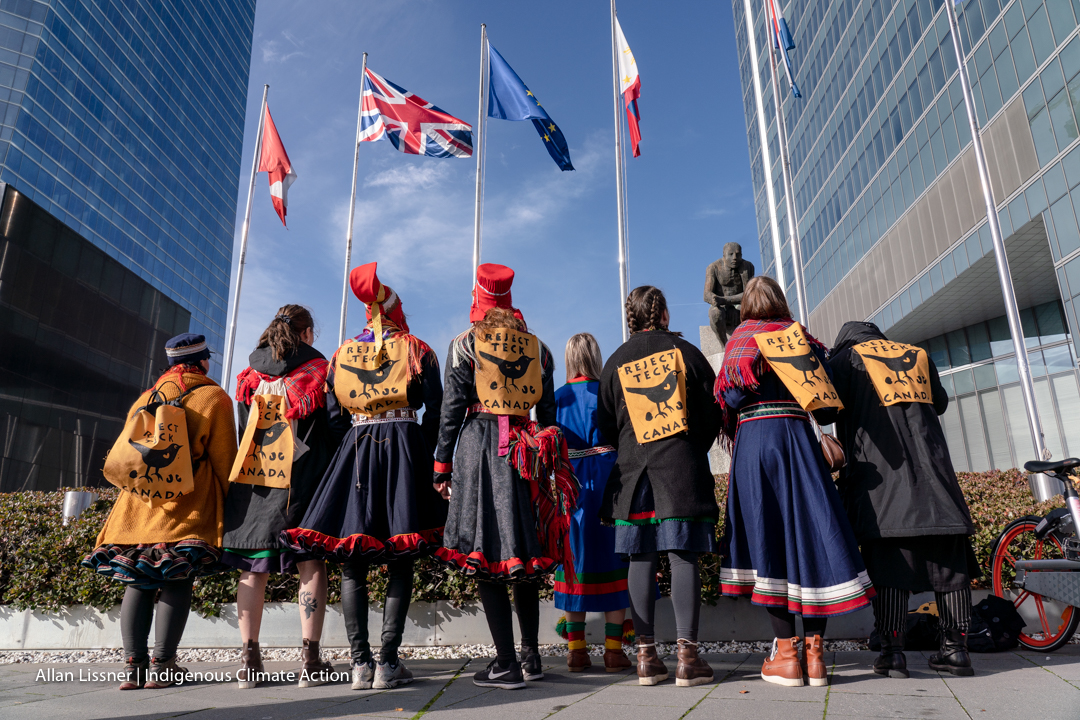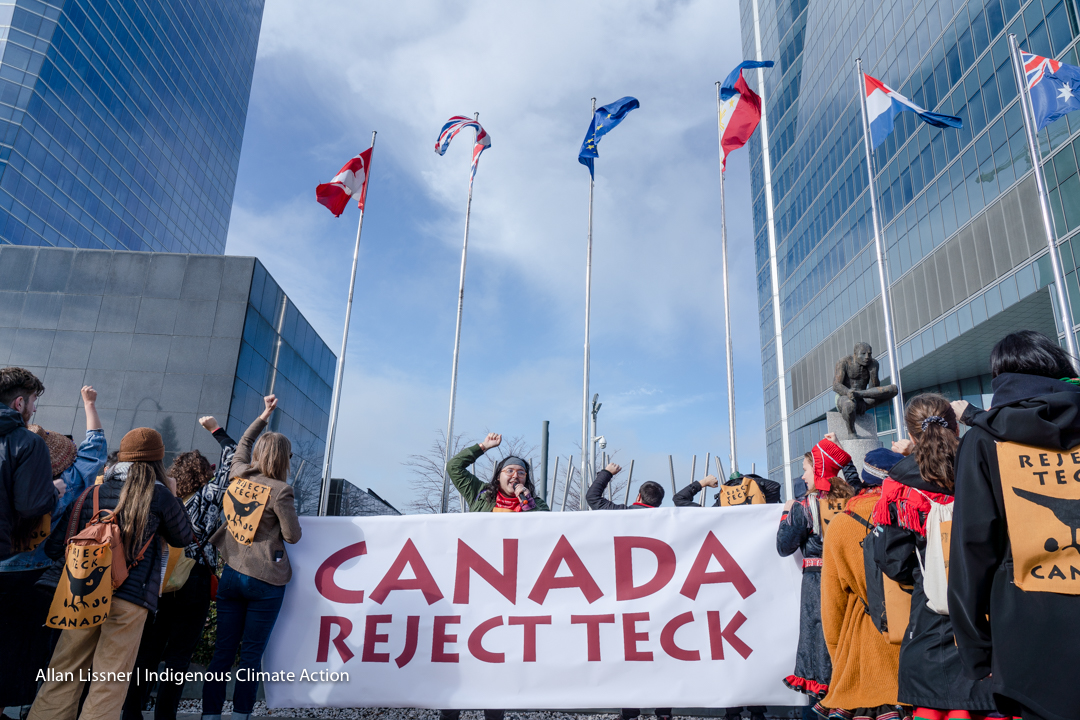A pair of protests were held this week at the United Nations Climate Change Conference in Madrid that saw Indigenous activists speak out in opposition to a massive oilsands mine proposed for northern Alberta.

One of the protests was held Monday outside the Canadian embassy in Spain’s capital and another took place inside the COP 25 UN Climate negotiations, according to a news release issued by Indigenous Climate Action, which describes itself as “Canada’s premier Indigenous-led climate justice organization.”
The protests target the Frontier oilsands project, a $20.6-billion mine proposed by Vancouver-based Teck Resources Ltd., for an area that is about a one-hour drive north of Fort McMurray. Those proposing the project have said its ultimate production capacity would be about 260,000 barrels per day of bitumen, if approved.
READ MORE: Public invited to comment on proposed $20B Frontier oilsands mine project in Alberta
Earlier this fall, the Impact Assessment Agency of Canada invited members of the public to comment on the Frontier project proposal. The window for offering comment closed late last month.
“A report released last week by 17 research and campaigning organizations, used oil and gas industry projections to show that Canada will be one of the worst violators of the Paris Agreement if it expands its oil and gas extraction as planned, second only to the United States,” read the statement issued by Indigenous Climate Action on Tuesday.
“Rejecting the Teck Frontier mine is an important first step the federal government can take to ensure a safe climate future.”
READ MORE: ‘Catastrophic’: Canada set to miss 2030 emissions target by 15%, UN report says

Elder Francois Paulette said all 33 First Nations of the Dene Nation, which he represents, are opposed to the proposed Frontier mine as well as expansion of the oilsands in general.
Over the summer, a federal-provincial panel ruled that the oilsands project was in the public interest even though it could fundamentally cause harm to both the environment and to Indigenous people. The panel offered recommendations for mitigating harm to wildlife, tracking pollutants and for consulting with nearby First Nations.
Environment and Climate Change Minister Jonathan Wilkinson is now tasked with weighing the findings and recommendations of the panel report with public comment before making an environmental assessment decision on the Frontier mine.

Get weekly money news
“We must force Canada to reject Teck,” Eriel Deranger, the executive director for Indigenous Climate Action, said in Tuesday’s news release.
“Aside from the detrimental impacts it will have on my people’s food security, treaty rights and water, It will add 6.1-million megatonnes of carbon annually to the atmosphere.”
Teck Resources has said it projects the mine will emit 4.1 megatonnes of carbon dioxide a year.
The Green Party of Canada tweeted a photo on Monday of its leader, Elizabeth May, joining protesters in Madrid to voice concerns about the proposed oilsands mine.
“We need to respect Indigenous rights and end this climate-killing project,” the tweet said.
On Tuesday, Alberta Premier Jason Kenney met Prime Minister Justin Trudeau in Ottawa to discuss a number of issues. Among them, Kenney pushed for Trudeau and his government to approve the Frontier project.
READ MORE: After meeting with Trudeau, Kenney says next few weeks critical for Alberta-Ottawa relations
Since his United Conservative Party formed Alberta’s provincial government in the spring, Kenney has spoken out about issues facing Alberta’s oil and gas sector and taken steps that he says are aimed at reviving the embattled sector, which has struggled to regain its footing after the spectacular collapse in oil prices in 2014.
Kenney’s government has also launched a so-called “energy war room” which is aimed at countering criticism of Alberta’s energy industry.
When asked for comment on the protests against the Frontier oilsands proposal and on the project itself, a spokesperson for Alberta Energy Minister Sonya Savage sent Global News a statement via email.
“Teck’s Frontier project has successfully obtained approval from the Government of Alberta,” Kavi Bal wrote in a statement. “If approved by the federal government, the Frontier project would result in 7,000 jobs during construction and 2,500 jobs during operations.”
The spokesperson said “14 Alberta First Nations and Métis in the area” have signed agreements with Teck in support of the project.
“The Joint Review Panel quotes in their report ‘the extent of agreement between Teck and Indigenous groups is unprecedented for an oilsands development of this type.’ We’d encourage Ms. May and others to speak to the First Nations in the region who support the project,” the statement said.
Teck Resources issued the following statement regarding the protesters’ concerns:
Teck is committed to advancing the Frontier project forward in a manner that is respectful of Indigenous Peoples and local communities, is environmentally and socially responsible, and will create significant value for Alberta and Canada.
The regulatory submission for Frontier was the most detailed and comprehensive in oil sands history, incorporating extensive environmental and social data, and more than a decade of community engagement.
Teck reached agreements with all 14 Indigenous communities in the broader Frontier project area, including the Athabasca Chipewyan First Nation, Mikisew Cree First Nation and Fort McKay First Nation. These participation agreements support engagement between Teck and Indigenous communities and set out a framework for co-operation in areas such as environmental stewardship and economic opportunities.
Frontier will incorporate industry-leading technologies and best practices. The greenhouse gas emissions intensity of Frontier will be approximately one half of the oil sands industry average and will be a lower carbon intensity than about half of the oil currently refined in the United States.
Watch below: Some Global News videos about the Alberta oilsands.
On Friday, McMurray Métis President Gail Gallupe issued a statement about the Frontier oilsands project and said McMurray Métis support the proposal. You can read the statement below:
We have entered into a long-term sustainability agreement with Teck Resources, who have made considerable environmental stewardship commitments regarding the Frontier Project. We have also jointly committed to significant ongoing efforts on critical areas of importance to McMurray Métis and its members throughout planning, construction, operation and reclamation of the Frontier Project.
The joint efforts of McMurray Métis and Teck Resources include ongoing mitigation, monitoring and management of the Frontier Project impacts to the environment and McMurray Métis traditional use and harvesting rights.
The outside organizations that have been in the media don’t speak for our community. We have worked hard to ensure that the environment and our Métis rights are protected, while also ensuring our community benefits from this type of responsible development by Teck Resources.
–With files from The Canadian Press



































Comments
Want to discuss? Please read our Commenting Policy first.